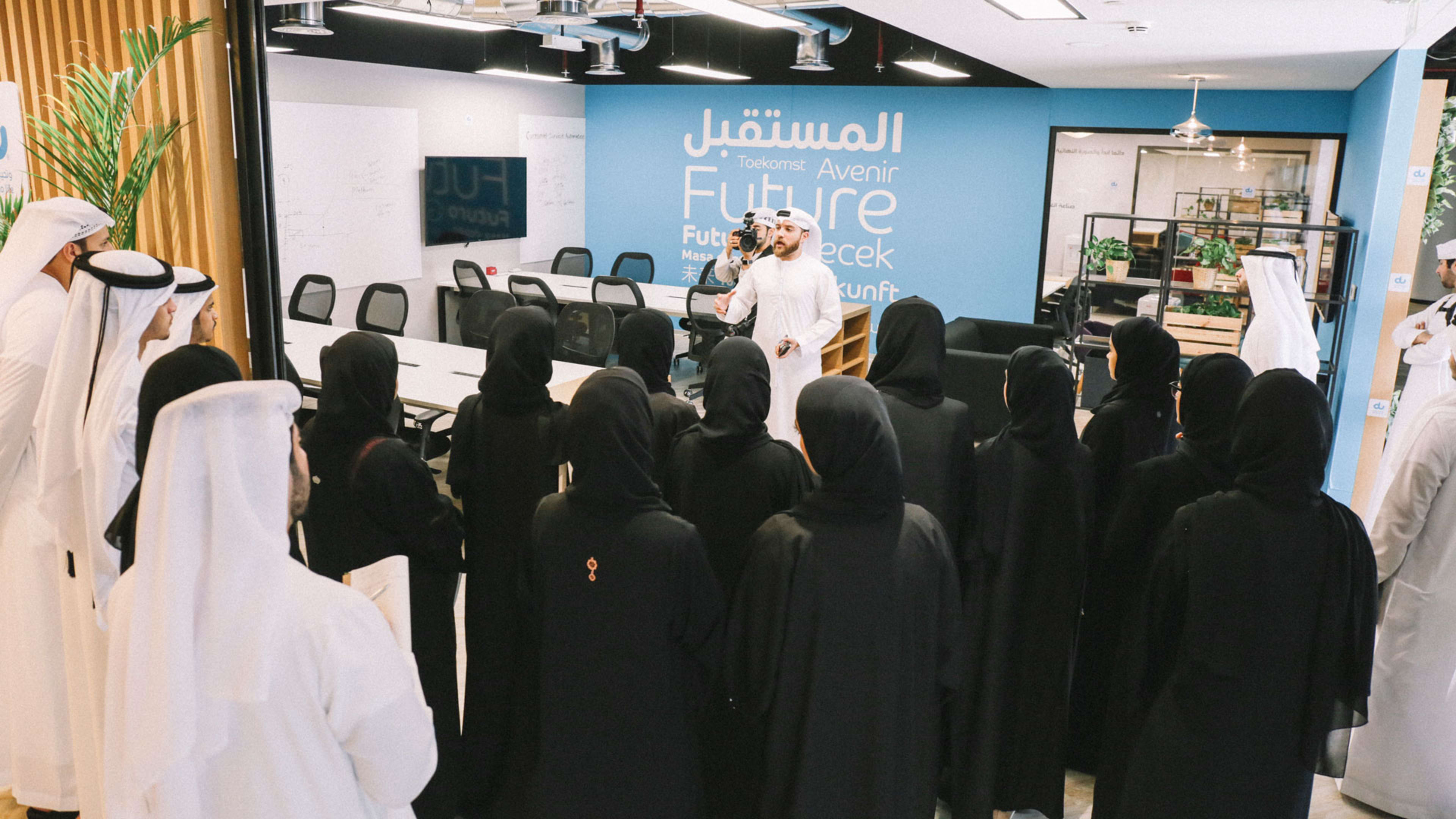The sloping rooftops of the 1,000-foot-tall Emirates Towers float above the rest of the Dubai financial district like looming mountain peaks, but in a city of extravagant architecture they’re easy to miss. The complex’s lobby is just as sleekly anonymous as the exterior, greeting the public with the signature blitz of air conditioning and luxury retail chains that can give Dubai’s entire downtown the feel of an upscale airport terminal. But in the mezzanine-level Starbucks, the mood changes–software engineers in jeans and sneakers gossip about funding rounds and hash out coding snags.
Close by is a wide and winding hallway flanked with conference rooms, exhibit displays, and storefront-like work spaces filled with young people from all backgrounds—the rare working office that seems to invite the curious to come have a look around. “Considering it’s a government office, it’s a very community space,” says Karin Gabriel, program development manager at Dubai Future Accelerators (DFA), a rare amalgam of entrepreneurial hub and government bureaucracy. DFA isn’t even really an accelerator of the type common in Silicon Valley, at least not in the usual sense—”We accelerate government innovation,” as Gabriel puts it.
At DFA, 12 Dubai government entities, including big-ticket state assets like Emirates Airlines, choose among applicants whose technologies could help improve the agency’s services and operations. Selected startups get free travel and accommodation, office space, and a nine-week development course in which they work closely with a government liaison. If things go well, the government agency and the startup sign a memorandum of understanding outlining a future relationship. DFA’s one headline-grabbing success story to date is Hyperloop One, which a program participant that is now exploring the possibility of building a “hyperloop for cargo” at one of Dubai’s government-owned ports. Out of 65 companies that have completed the program, which started last year, some 74% have signed memoranda of understanding.
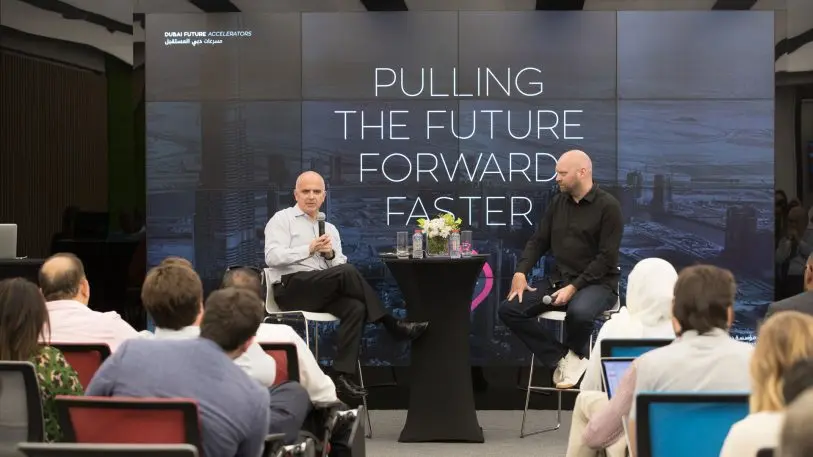
Ata Ghofrani’s company, Houston-based MistBox, builds a small device that regulates the temperature of the cooling units inside of air conditioners, increasing the system’s energy efficiency. In Dubai, which would be unlivable without air conditioning, the city’s electricity utility quickly recognized the technology’s uses. As a DFA participant, Ghofrani got to meet with a government official each week, and scored a sit-down with the utility company’s director general. “Outside the accelerator, we wouldn’t have taken the leap of just setting up an international office and seeing what’s up,” says Ghofrani. Thanks to DFA, MistBox laid the groundwork for its first foreign office and finalized an MoU with the Dubai government, giving it a crucial opportunity to prove its technology can work at scale.
DFA’s model is different from just about every accelerator in the U.S., but it helps reveal why Dubai is emerging as a startup hub. According to the market intelligence firm CBInsights, startup investment in the UAE surpassed $1 billion in 2016, a year which also saw a 45% increase in the number of privately owned startups that received equity funding in the country.
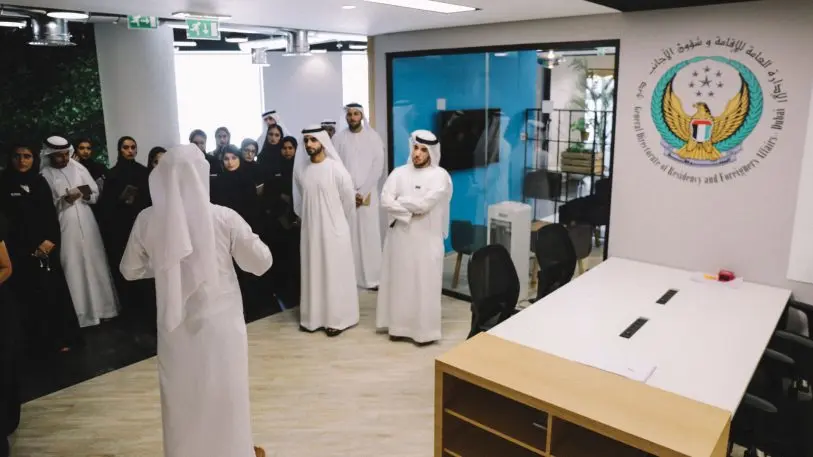
A tech economy is essential for a place with Dubai’s ambitions. Dubai glitters with evidence of its stratospheric self-image—as well as the practical limits the city faces. Entire artificial island chains sit empty, waiting for a luxury building boom that might never come. Half-finished projects dot the skyline, and there’s evidence of a slight economic slowdown, partly because of the long-term drop in the price of oil—the UAE’s GDP is expected to grow only 1.7% in 2017, and Dubai’s vaunted air travel, real estate, and retail sectors are all losing steam. The impossible extravagance of a semi-inhabited built environment raises the question of what, if anything, could possibly support it all.
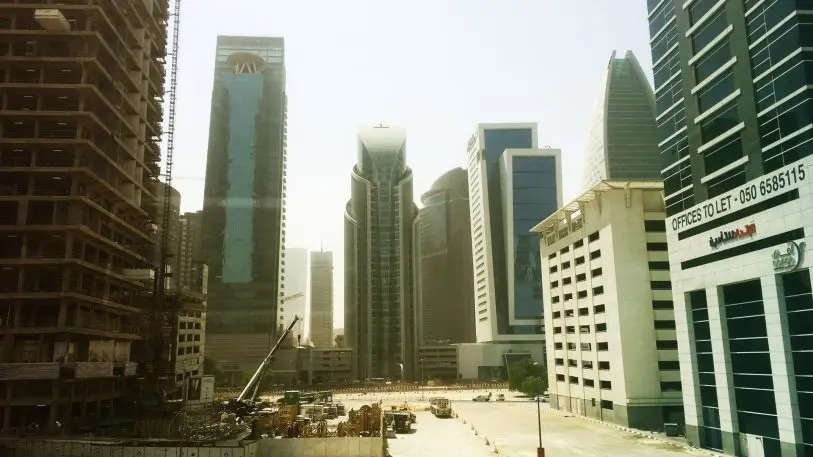
Oil is only part of the answer. Although Dubai’s daily production topped out at a modest 410,000 barrels per day in 1991 and now stands at around 70,000, the emirate thrives on proximity to the region’s oil and natural gas giants, and suffers when commodity prices dip. Dubai has also leveraged its geographic centrality: Some 2 billion people live within a four-hour flight, and it’s not uncommon to meet businessmen who base themselves in Dubai but fly to Tehran or Karachi every workweek. Dubai’s emir, Mohammed bin Rashid al-Makhtoum, has talked about finding a durable source of wealth and importance for his city for when the oil economy inevitably collapses, or in case people and capital become more evenly spread between other neighboring logistics hubs. “The whole vision is to essentially transition away from one or two massive industries,” says Zaen Hamid, head of operations for the Dubai-based incubator AstroLabs.
So far, the city has tried to import a startup ecosystem, in the hopes this will help create the economic and social conditions for a self-sustaining tech economy. Dubai’s startup scene is an experiment in whether there’s really such a thing as innovation by decree.
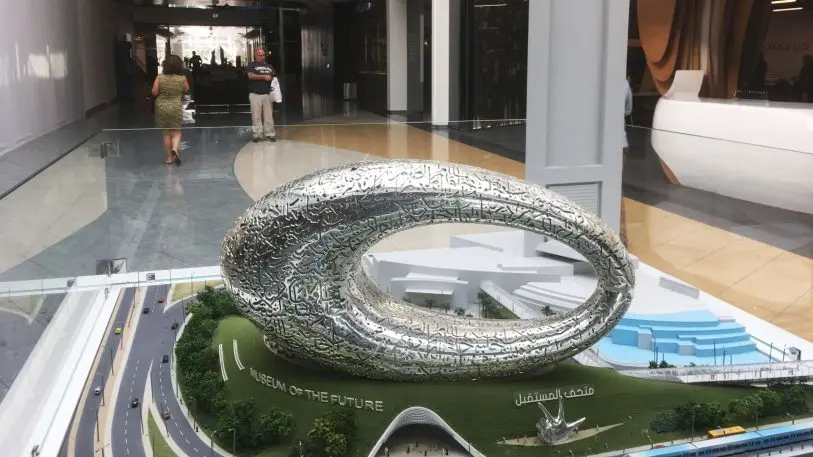
The Opposite of Silicon Valley: Built From The Top Down
Many of the differences between the Dubai and American startup ecosystems owe to one simple fact: However enlightened and far-looking its leadership might be, the UAE is still inevitably a monarchy, governed on behalf of a small collection of firmly entrenched families without much in the way of democratic input. As a result, sectors of Dubai’s startup economy are being built from the top down, in ways that wouldn’t be replicable in much of the U.S.
An American city could lure startups through tax incentives, or especially high-functioning public services. In Dubai, the government can be much more hands-on. Evan Burfield, CEO of Washington, D.C.-based 1776, a workspace and incubator that has a location in the Emirates Towers that opened last year, says that one 1776-affiliated company, called Arrow Analytics, was able to ink a deal to scan the entire Dubai Electric and Water Authority’s infrastructure by drone barely two months after getting to town.
If the public sector’s commitment is there, things can move incredibly quickly. “Sheikh Mohammad comes out and says we’re going to be a world leader in solar or autonomous by this date, and you watch,” says Burfield, describing the leadership’s mind-set. “Every other part of the government, business, and social ecosystem organizes around that goal in a way that you just don’t see in the U.S. … The ruler of Dubai can control the regulatory infrastructure, and he can control the allocation of capital to a large extent.”
There are also less visible ways in which the government has tried to make Dubai an attractive place for startups. AstroLabs, which launched in cooperation with Google in early 2015, occupies a ground-floor storefront in the Jumeirah Lakes Towers, a concrete plane of unfinished high-rises hugging a very artificial-looking pond. Even during the city’s hellish August down weeks, the part-workspace, part-incubator is packed with young entrepreneurs from around the world—when I visited, the AC/DC banger “Hell’s Bells” roared from one of the conference rooms.
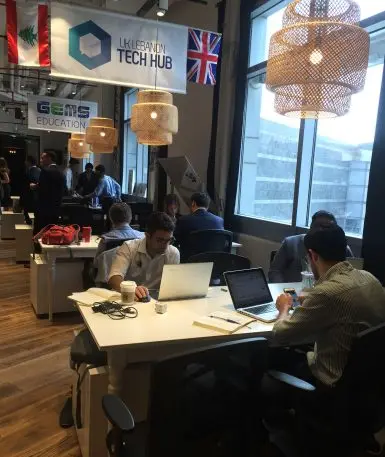
As Hamid explains, AstroLabs is a private enterprise that exists because of a wrinkle in Dubai’s regulatory structure. The Jumeirah Lakes Towers, and thus AstroLabs, sits within the Dubai Multi Commodities Center (DMCC), the emirate’s largest “free zone”–a geographic area managed by a government corporation where companies can operate with complete foreign ownership while also being exempted from certain taxes and fees. The AstroLabs suite is now some of the most in-demand real estate in the Dubai tech world: The space has a 15-20% acceptance rate, and picks companies based on a “mini VC-analysis” of their viability, Hamid says. Today, it hosts 100 companies, of which 30-40% are “marketplaces” of some kind—tenants include apps that help users hire spa services and musical talent. Dozens of countries are represented, although Hamid says that French and Egyptian entrepreneurs are especially prevalent.
AstroLabs succeeds partly because it takes care of one of the most significant barriers to entry in Dubai—Hamid explains that without the incubator’s free zone office space, it could cost as much as $50,000 for a startup to charter a company outside of the DMCC’s auspices. The high price of starting a business isn’t the only thing a would-be tech entrepreneur needs to be mindful of in Dubai. The regulatory and legal framework is lagging behind the tech ecosystem’s recent growth. As a result, it’s risky for a company to operate in Dubai without having most of its ownership held outside of the UAE, as one entrepreneur explains: “Companies need a holding abroad to hold shares, intellectual property, etc, due to weak laws and an unadapted system.”
For instance, although bankruptcy laws are in the process of being reformed, protections aren’t nearly as robust as in the U.S. and the cost of a company’s failure is potentially steep—even inside the free zones, it’s difficult to charter a company if a founder already has significant debts on the books. The government’s attitude toward debt is generally less forgiving in Dubai than in the U.S. Many of the debtors who fled the city during its 2008 economic crisis–sometimes abandoning their Lamborghinis at the airport parking lot–would get thrown in prison if they ever came back.
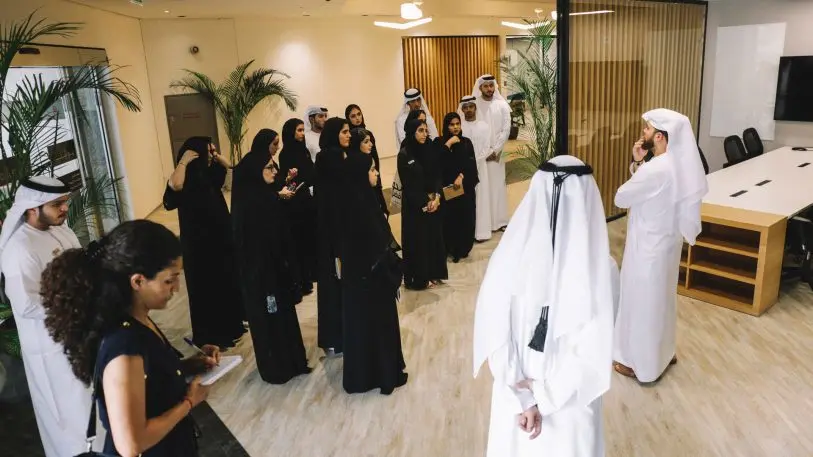
“Dynamics in these markets are different,” Hamid says, stressing the importance of a company navigating a new regulatory regime, having a consistent on-the-ground presence, and offering at least some Arabic-language features and content. Dubai has a few emerging VC firms, including Wamda Capital, which launched a $75 million Middle East-specific venture fund in 2015. But the ecosystem hasn’t matured to the point where big-money exits, like Amazon’s $800 million acquisition of the Dubai-based online retailer Souq.com this past March, are all that common: “In this region, MNA with corporates doesn’t exist yet,” Hamid cautions. The city has yet to produce a true unicorn of its own—although Careem, a higher-end Uber-style service popular in Dubai and Abu Dhabi, is said to be valued at around $1 billion.
A lot of investment still comes through family offices, making fundraising a less formalized and sometimes more relationship-based process than in Silicon Valley—”In the U.S., you do the deal and become friends,” as one American working in Dubai puts it. “Here, you become friends, and then do the deal.” Everyone avoids politics. As more than one person explains it, under the UAE’s implied social contract, there’s a wide latitude for personal freedom as long as conservative social mores and the existing political order are respected in the public sphere. For the especially socially conscious entrepreneur, the city is rife with potential moral hazard, considering how much of the economy–and how many disruptable economic sectors, like construction–are run on cheap and easily exploited migrant labor.
Overall, it’s difficult for a startup to simply set up an office in Dubai and hunt around for opportunities. Instead, Dubai Futures, AstroLabs, and 1776 give companies workspaces, connections, and a critical time frame for proving their business models at a level that might not be possible in a more saturated or less state-driven ecosystem. “Dubai wants to be a place where people from all around the world with great ideas come to to scale those ideas,” Burfield says.
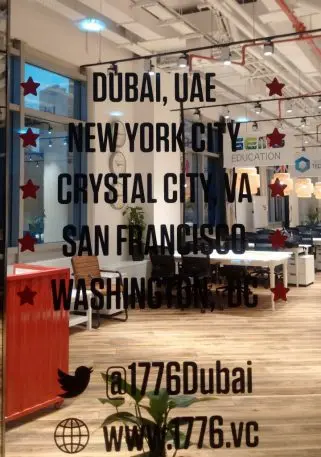
Big Dreams, Plenty Of Ambition–And High Stakes
Still, Dubai is only a city of 3 million. Both the size of the immediately available market, and the pool of potentially available investment capital, is much smaller than in the U.S., even if everyone agrees that the competition is far less fierce. “As a founder of a small company, you can build a $50 million company,” says Ghofrani. “Fifty billion—you can’t really do that. You can’t build an Uber.”
Dubai could eventually be the kind of place from which large companies are launched, rather than one where smaller startups can take a chance on an alluringly different way of doing business. Mukund Menda, a serial entrepreneur and veteran of the Dubai tech scene, is hopeful that an organic creative environment is emerging in the city. “A lot of talent is coming out here that believes in this place, which is good,” he says. Menda’s company, Civil Maps, which develops 3D mapping software for possible use in autonomous vehicles, was in the first cohort at DFA, and worked with Dubai’s Roads and Transit Administration. He says that even over the past couple years, Dubai has noticeably more angel investors, VCs, and “corporates willing to partner with startups.”
But for now, much of the the city’s advantages stem from having a leadership with few real checks on its power. Lofty, even outlandish objectives are routinely set from on high. The city wants to have “the world’s first blockchain-powered government” by 2020. It aims to be “the world’s 3D-printing hub,” as well as the world’s smartest city by 2021. It wants to build a Martian colony by 2117. The Roads and Transit Administration aims for a quarter of all rides in Dubai to be driverless by 2030. Was it possible? The irrepressible Menda allows himself a rare pause, and starts to count on his fingers, measuring out the time it would take to meet the needed technical benchmarks. “It’s achievable eight or nine years from now,” he says, with an excitement suggesting this was something more than an idle back-of-the-envelope calculation.
At the moment, no one, including the Dubai government, can really know if its road transportation will be a quarter driverless within the next 13 years, never mind whether a country with less than 2 million citizens can launch a credible Mars mission. The goal of being the “world’s smartest city” is similarly grandiose and nebulous–which is not to say that it’s totally meaningless, either. Dubai has developed based on the idea that absolute monarchs can build a dynamic, 21st-century city. The startup ecosystem will be a crucial test case of how true that really is.
Recognize your brand’s excellence by applying to this year’s Brands That Matter Awards before the early-rate deadline, May 3.
